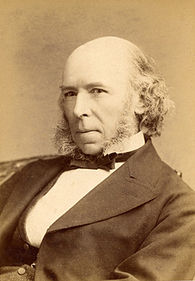
Back البقاء للأصلح Arabic Оцеляване на най-приспособения Bulgarian Supervivència del més apte Catalan Survival of the fittest Danish Survival of the Fittest German Supervivo de la plej taŭgaj Esperanto Supervivencia del más apto Spanish بقای اصلح Persian Kelpoisimman eloonjääminen Finnish Survie du plus apte French

"Survival of the fittest"[1] is a phrase that originated from Darwinian evolutionary theory as a way of describing the mechanism of natural selection. The biological concept of fitness is defined as reproductive success. In Darwinian terms, the phrase is best understood as "[s]urvival of the form that in successive generations will leave most copies of itself."[2]
Herbert Spencer first used the phrase, after reading Charles Darwin's On the Origin of Species, in his Principles of Biology (1864), in which he drew parallels between his own economic theories and Darwin's biological ones: "This survival of the fittest, which I have here sought to express in mechanical terms, is that which Mr. Darwin has called 'natural selection', or the preservation of favoured races in the struggle for life."[3]
Darwin responded positively to Alfred Russel Wallace's suggestion of using Spencer's new phrase "survival of the fittest" as an alternative to "natural selection", and adopted the phrase in The Variation of Animals and Plants Under Domestication published in 1868.[3][4] In On the Origin of Species, he introduced the phrase in the fifth edition published in 1869,[5][6] intending it to mean "better designed for an immediate, local environment".[7][8]
- ^ Spencer, Herbert (1864). Principles of Biology, Volume 1. Williams and Norgate. p. 444.
But this survival of the fittest, implies multiplication of the fittest.
- ^ "Survival of The Fittest". vedantu.com. n.d. Archived from the original on 5 December 2023. Retrieved 30 November 2023.
- ^ a b "Letter 5140 – Wallace, A. R. to Darwin, C. R., 2 July 1866". Darwin Correspondence Project. Archived from the original on 25 November 2010. Retrieved 12 January 2010.
"Letter 5145 – Darwin, C. R. to Wallace, A. R., 5 July (1866)". Darwin Correspondence Project. Archived from the original on 13 May 2011. Retrieved 12 January 2010.
^ "Herbert Spencer in his Principles of Biology of 1864, vol. 1, p. 444, wrote: 'This survival of the fittest, which I have here sought to express in mechanical terms, is that which Mr. Darwin has called "natural selection", or the preservation of favoured races in the struggle for life.'" Maurice E. Stucke, Better Competition Advocacy, archived from the original on 30 April 2011, retrieved 29 August 2007, citing HERBERT SPENCER, THE PRINCIPLES OF BIOLOGY 444 (Univ. Press of the Pac. 2002.) - ^ "This preservation, during the battle for life, of varieties which possess any advantage in structure, constitution, or instinct, I have called Natural Selection; and Mr. Herbert Spencer has well expressed the same idea by the Survival of the Fittest. The term "natural selection" is in some respects a bad one, as it seems to imply conscious choice; but this will be disregarded after a little familiarity." Darwin, Charles (1868), The Variation of Animals and Plants Under Domestication, vol. 1 (1st ed.), London: John Murray, p. 6, archived from the original on 4 March 2016, retrieved 10 August 2015
- ^ Freeman, R. B. (1977), "On the Origin of Species", The Works of Charles Darwin: An Annotated Bibliographical Handlist (2nd ed.), Cannon House, Folkestone, Kent, England: Wm Dawson & Sons Ltd, archived from the original on 13 February 2011, retrieved 22 February 2009
- ^ "This preservation of favourable variations, and the destruction of injurious variations, I call Natural Selection, or the Survival of the Fittest." – Darwin, Charles (1869), On the Origin of Species by Means of Natural Selection, or the Preservation of Favoured Races in the Struggle for Life (5th ed.), London: John Murray, pp. 91–92, archived from the original on 24 May 2011, retrieved 22 February 2009
- ^ Cite error: The named reference
sjgwas invoked but never defined (see the help page). - ^ "Evolutionary biologists customarily employ the metaphor 'survival of the fittest,' which has a precise meaning in the context of mathematical population genetics, as a shorthand expression when describing evolutionary processes." Chew, Matthew K.; Laubichler, Manfred D. (4 July 2003), "PERCEPTIONS OF SCIENCE: Natural Enemies – Metaphor or Misconception?", Science, 301 (5629): 52–53, doi:10.1126/science.1085274, PMID 12846231
© MMXXIII Rich X Search. We shall prevail. All rights reserved. Rich X Search